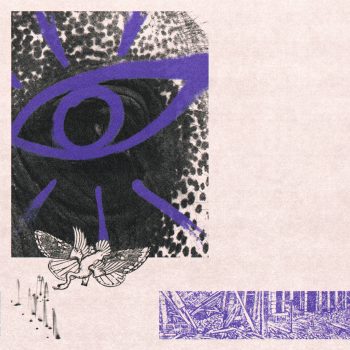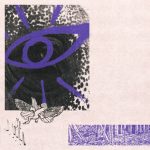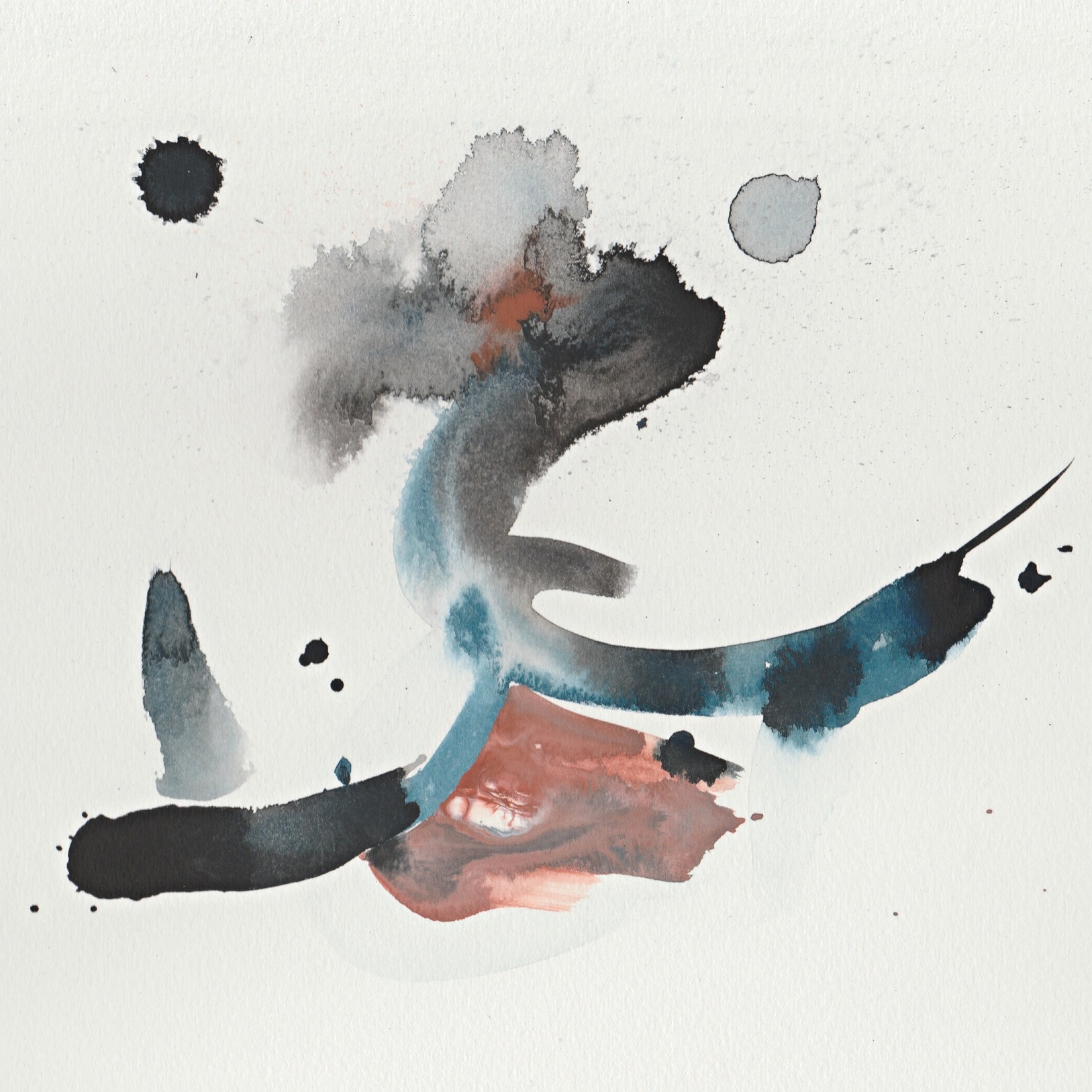Atwood Magazine sits down with Whistler Isaiah and Nathan Stocker of Hippo Campus about their latest album ‘LP3’: a prolific cluster of unexpected sound, sincere lyricism, and self-aware vulnerability.
•• •• •• ••
The past four years have been busy for Hippo Campus, to say the least. From stacked studios to sold-out shows, it’s hard to believe the band began as a group of guys who were looking to make their friends dance. The five then-teenagers were plucked out of a performing arts high school in St. Paul, handed a backpack with the essentials, and thrown onto the nearest tour bus.
Today marks the release of their latest record, LP3 (out February 4, 2022 via Grand Jury Music), following past albums Landmark and Bambi. The “indie sweethearts” went through a two-year internal revolution, leading them to this release. It’s clear that LP3 is not only Hippo Campus’ masterpiece, but it is their most important collection yet. It’s the music that mended the band’s bones, their reminder of their reason for being – the “why” of Hippo Campus.

For longtime listeners, this may be their introduction to a “new” sound. But that’s not necessarily the case for the band. LP3 is a homecoming, Hippo Campus fully formed and fully realized. It’s a sonic playground. Album opener “2 Young 2 Die” kicks down the doors, making it quite clear that we’re not in Kansas anymore. This stream-of-consciousness neuroticism continues with “Blew Its,” a kaleidoscope of ideas. Its images are cut in half and flipped on their head in a colorful frenzy. The verses switch their rhythm abruptly, keeping you on your toes. The bridge comes in and with it one of the most exciting moments of the entire album. Distortion opens up a sinkhole of sound as lead singer Jake Luppen muses, “Should probably get myself a jacket, if you wanna try to build back up. Goddamn it’s a cold affection, goddamn it’s a slow affection.” The newfound lyrical honesty is a stark change from past poetic prose. Blame maturity or even bitterness, but either way, the band does not have any time to waste. Moments of levity are also sprinkled in, notably with “Ride or Die.” Born from an impromptu jam session, the song is pure fun. Shades of the beloved guitar make their way through the groove, topped with double dutch lyrics.
The songs are crafted down to the second. The flow is anything but forced, and the tracks manage to hold their own within the madness. “Listerine” is a perfectly crafted lullaby. Its self-awareness is spellbinding, spinning dark daydreams in its wake. With thin, delicate harmonies, the guitar plays a simple and sweet melody as Lupin sings, “But you can’t wash the fucked up out of me tonight, despite how hard you try.” The haze continues with “Boys,” a hangover so bad, it’s a fever dream. Luppen practically mutters to himself over and over again, “Kissing boys, missing work, got hung over from your words. Same New York, it’s the worst, all these nights are the worst.” The track hovers over a trance-like distortion, recounting nights that were cataclysmic at best. The fog dissipates, and we end with “Understand” a wistful recounting of not only the past nine songs but also the stories that got them there. The stories are told with the familiar touch of Stocker’s guitar and Luppen’s crystal-clear ache, closing the chapter on what was.

The album closes with the words: “I don’t care what we are, it just has to work. Where we end is somewhere far, something hard to understand.” The “why” of Hippo Campus is indeed hard to understand, but leave it to five boys from Minnesota who’d rather write their own songs for their friends than suffer in silence to figure it out. LP3 is distinctly and uniquely Hippo Campus. It is their what, their why, and everything in between.
Atwood Magazine sat down with Whistler Isaiah and Nathan Stocker of Hippo Campus to talk LP3. The drummer and guitarist join in a conversation to discuss the past, the present, and the hopeful future of Hippo Campus. Atwood Magazine hears first hand from the band about the journey that led them to the record – a process that involved asking what the hell is going on, how did we get here and what are we going to do about it?.
— —
Listen: ‘LP3’ – Hippo Campus
A CONVERSATION WITH HIPPO CAMPUS

Atwood Magazine: Thank you guys for your time! To start things off, listening to LP3 felt like listening to the aftermath of a crisis, something completely new. Is this accurate?
Nathan Stocker: We had been planning on taking 2020 off to just write music. Take a break from touring, and kind of take a breath because we had been touring pretty hard up until that point. So we started writing, everything felt great. Wouldn’t you know it, there’s a pandemic.The rest of the record we wrote quarantined, it was kind of half and half. It’s an interesting return to form kind of album in concept because we were in the studio with the intent of calling back to being in the room together and jamming and seeing what comes from that. Just getting back to the essence of the band, the “why” of Hippo Campus, essentially. What that means for us now, was making sure everyone was on the same page emotionally: trying to cultivate friendships first before tackling musical ideas. At the same time, it’s us finally making the studio album we’ve always been searching for, but didn’t have the experience for. We made it with our friend, Caleb. Finally, we have this album that feels like ours entirely and we achieved our goal of going back to being friends and making music from there.
You mentioned the ''why'' of Hippo Campus. Did you have a ''why'' figured out when you formed the band?
Nathan Stocker: We’ve always said that it was in an effort to make our friends dance, and have a good time. To make party music or I guess or what we thought was party music [laughs.] Just connecting with each other in the room playing our instruments, I think that was always the echelon of the band itself. That’s the deepest part of the band, being in the room playing our instruments live and trying to have fun making music. That’s what Hippo Campus is. Nowadays, our goals have changed individually, and having those needs met is something we communicate with each other. It’s kind of a wedding of old and new ideas and goals.
Now that you’ve moved forward. How have your perspectives changed on past albums Landmark and Bambi. Do you view them as stepping stones to LP3 and where you are now?
Nathan Stocker: It changes per member. What would you say, Whis?
Whistler Isaiah: I think every time we’ve released something new, it’s allowed us to reflect properly on the last project we did. I think if you were to ask all of us to go back and listen to those records, it wouldn’t be the easiest experience, for many different reasons. Somebody in the band recently said it’s like looking at a picture of yourself from high school. But for some reason, a lot of people thought you looked great! And they still like that version of you. Within the band, those are projects of the past that we have a lot of respect for, but we use them as a reminder of where we were and a reminder of where we want to be. I don’t think we will ever get to where we want to be. There’s no point in art if you’re settling.
Nathan Stocker: Each record we’ve released, even the EPs, are stepping stones in a way for us. It’s a never-ending search. Looking back at the albums, I can’t even visualize what those albums even sound like or feel like. Only the process of recording and writing those songs comes to me. For Landmark and Bambi both, they were pretty tumultuous times in our lives [laughs]. Bambi especially, the recording process was really isolating and divisive within the group. Landmark was just, who the fuck are those kids singing those songs? Every record, EP, and song, it’s interesting to watch yourself grow across the span of your work as an artist and individual. We’re excited for this next stone.
Watch: “Ride or Die” – Hippo Campus
I don’t want to boil it down too much, but do you guys think it has to do with the age factor? The time of growing, learning, and new experiences, is that where Landmark and Bambi came from?
Nathan Stocker: Absolutely. In our experience, from the discomfort of being thrown into this industry at such a rapid pace. It was just, deep end, immediately, writing those songs and records on the road. On top of that, just trying to figure out who the fuck you are as an individual.
Whistler Isaiah: I think I was starting to sense between all of us while we were recording Landmark at this professional, all-inclusive studio at the age of 20. I wasn’t feeling anything. I was running around aimlessly playing music and being a part of something. We all had different experiences, but shortly after that process, I started feeling things in a deeper and crazier way. Everything leading up to that time between Landmark and Bambi, we were very innocent, stupid kids.
Nathan Stocker: Some of us more innocent than others.
Whistler Isaiah: Yes. But the idea of being thrown into this industry at a young age. I didn’t have that feeling at that time. But when Bambi came around, I started to feel like, “What are we supposed to do?” I think that both albums reflect both those emotional states.
Nathan Stocker: But also really concerned with how we were perceived. Our image was debilitating.
Whistler Isaiah: I would say Bambi was an even more dramatic version of that. I felt very responsible for everything.
I’ve been conceptualizing the three albums. Feel free to disagree with this analogy! Landmark is the little brother of the trio, always out and smoking in the parking lot with his friends. Bambi is the middle child, the daughter who is in her emo phase, definitely jaded. LP3 is the eldest brother, very responsible and in control?
Nathan Stocker: I love that.
Whistler Isaiah: For sure. I think that’s pretty accurate.
Nathan Stocker: Yeah, the process was a lot. The weird dichotomy of having a 6-digit album that you’re supposed to make and trying to ask questions about yourself. Am I depressed? Am I having fun? The dichotomy of that just pulled us apart. There was so much riding on making something that was successful. We had gone from Zach’s basement to Lollapalooza. I think that’s a difficult thing for any artist. In our case, as collaborative as this is and as democratic as we want it to be, doing that and accounting for everyone’s feelings is hard. I’m thankful that we’re still a band!
You guys have known each other forever! As friends and collaborators, how do you keep it healthy and functional?
Whistler Isaiah: We try.
Nathan Stocker: Communication is key.
Whistler Isaiah: It’s like any other relationship. Early on, I was comparing it to being married to three people at once. There’s a lot of shit on the line. They’re amplified relationships, it’s a friendship plus your career and your life. We’ve hit some bumps in the road, every once in a while. But none that have damaged us to a point of genuinely struggling. We can always end up talking to each other and move on.
Nathan Stocker: We’re just dudes. We’re all pretty quiet and reserved when it comes to expressing ourselves. It’s a slow process to learn and trust that.
Were you hesitant to hash it out in the beginning?
Whistler Isaiah: We were probably better at it early on. We don’t do it as often these days, but it’s something we lean on in moments of confusion.
Nathan Stocker: Musically, I think the conversations are a lot more streamlined and efficient. We’ve always had a high volume of songs and material to work on. Sorting through all that and finding a theme has gotten easier over the years. I think that’s represented well in the upcoming record. Circling back to the older brother – three orphans on the street. One’s got holes in their shoes, and the other is buck-naked. But this orphan is providing for the other two in a way that is very loving, albeit not a lot to spare. All of our albums are orphans [laughs].
With ''Semi Pro,'' you guys address the big bad wolf that is the music industry. You touched on it already, but what did being thrown into the industry look like? How does it look now?
Nathan Stocker: It’s a daily struggle. There are so many different sects and pockets of it that you don’t feel like you belong in. It’s a daily practice of sitting back and asking ourselves: What do I want to do? “What do I want to make?” How do I make it in the most honest way I can? In terms of business, we’ve been very blessed to have success in this crazy field. That allows us to sit back and think about our place in the industry at large. It’s nerve-wracking at times to ask yourself if you’re making something worth listening to. Lots of outside looking in. At the end of the day, the questions that matter are: “Do I like this?”, “Am I happy doing this?”, and “Is everyone in this project fulfilled?” If you can answer yes to all of those, everything else is superfluous.
LP3 sounds like it has two different voices/vibes running throughout the songs. There’s a lullaby feel to ''Scorpio'' and ''Listerine'' while ''2 Young 2 Die'' and ''Blew Its'' are more chaotic. Was this an intentional shift in writing or organizing the album?
Nathan Stocker: It just kind of happened. “Blew Its” is an example of the first half of writing and working on the album, before lockdown in March 2020. “Scorpio” and “Listerine” came from everyone working from home and trading ideas via iPhone recordings and Group Facetime calls every day. Getting used to that way of working was a stark comparison to how we were doing things yesterday, essentially.
Whistler Isaiah: We had a lot of songs to pick and choose from. We picked what felt the most realized, listening to the earworms and hooks. We were sitting with fifteen as the original album length and whittled it down from there.
Nathan Stocker: I think we presented forty total songs for the project.
Whistler Isaiah: Twenty-five of those were intentionally played with and attempted.

Did any of those make their way onto Good Dog, Bad Dream, your recent EP?
Nathan Stocker: “Where to Now” and “Deepfake” were presented for the album.
Whistler Isaiah: “Mojo Jojo” was mostly finished. We didn’t have to do any tracking for that one. It was insane and chaotic.
You guys hinted to the new sound earlier this year with the release of ''Good Dog, Bad Dream.'' Besides that difference, what struck me was the lyricism of LP3. It’s more honest and direct than past lyrics. Can you expand on that?
Nathan Stocker: We recorded “Good Dog, Bad Dream” after finishing the album. Jake went through a lot of grappling experiences. We were done with skirting around things and writing in a more poetic way, we wanted it to be what comes out, comes out. One night, Jake was working on “Bad Dream Baby,” we liked the vibe. “Where to Now” and “Deepfake” also have that frank attitude. We had moved into a new studio space, and we had this opportunity to work together on something of our own, and we just went for it. It felt like a nice cleanse.
Do you guys write together?
Nathan Stocker: We do a bit of everything. We did a lot of at-home writing. More often than not, Jake and I will bring an idea to the group and everyone will collaborate on it. With the return to form idea, we got in the studio and began to jam. “Ride or Die” came from that. Depends on what the song itself is calling for.
Were there any do’s and don'ts when returning to the studio after two years?
Whistler Isaiah: Nothing strict. One of our first goals was to try and steer clear of the linear path we were on while making Bambi. Also, trying to avoid that mindset. We came into it trying to avoid what we did with Bambi, where we disappeared, wrote separately, and came back together attempting to make an album out of that. We wanted to walk into the studio together and set the vibe.
Nathan Stocker: Just trying to get back to the “why” of Hippo Campus. That’s why we brought on our friend Caleb Hinz, who produced the album with us. He’s known us since high school and is a part of the community in ways we’ve always admired. We wanted to extrapolate the Hippo-ness of Hippo.
Were there any inspirations or specific artists you had on repeat while recording?
Whistler Isaiah: I think I was really into Andy Shauf at the time.
Nathan Stocker: A bit of everything on my end. My biggest guitar inspiration is Julian Lage, who I listen to all the time.
Whistler Isaiah: The Japanese House record.
Nathan Stocker: Lots of Grimes, lots of Big Thief.
Whistler Isaiah: Lots of BRONCHO as a group.
What lessons will you take with you from recording LP3?
Nathan Stocker: I think it was a different iteration of the same lesson I’ve been trying to learn over the years. Be honest, be open, and don’t overthink shit.
Whistler Isaiah: The idea’s been a continuous one. But it took until this winter to have it hit me. I think I maybe struggled the most to breathe and go with the flow through the writing and recording process. With the rollout of this record, I can see the lesson more clearly. Don’t take things personally, and trust in your friends.
Nathan Stocker: Trust your friends, that’s a big one for sure.
Whistler Isaiah: It’s hard to trust your friends, especially when your whole career is on the line. But I think it’s going to continue forever. The lesson is learning how to handle and work with yourself when you get triggered by things.
Nathan Stocker: Keep learning.
— —

Connect to Hippo Campus on
Facebook, Instagram, Twitter
Discover new music on Atwood Magazine
? © Tonje Thilesen








